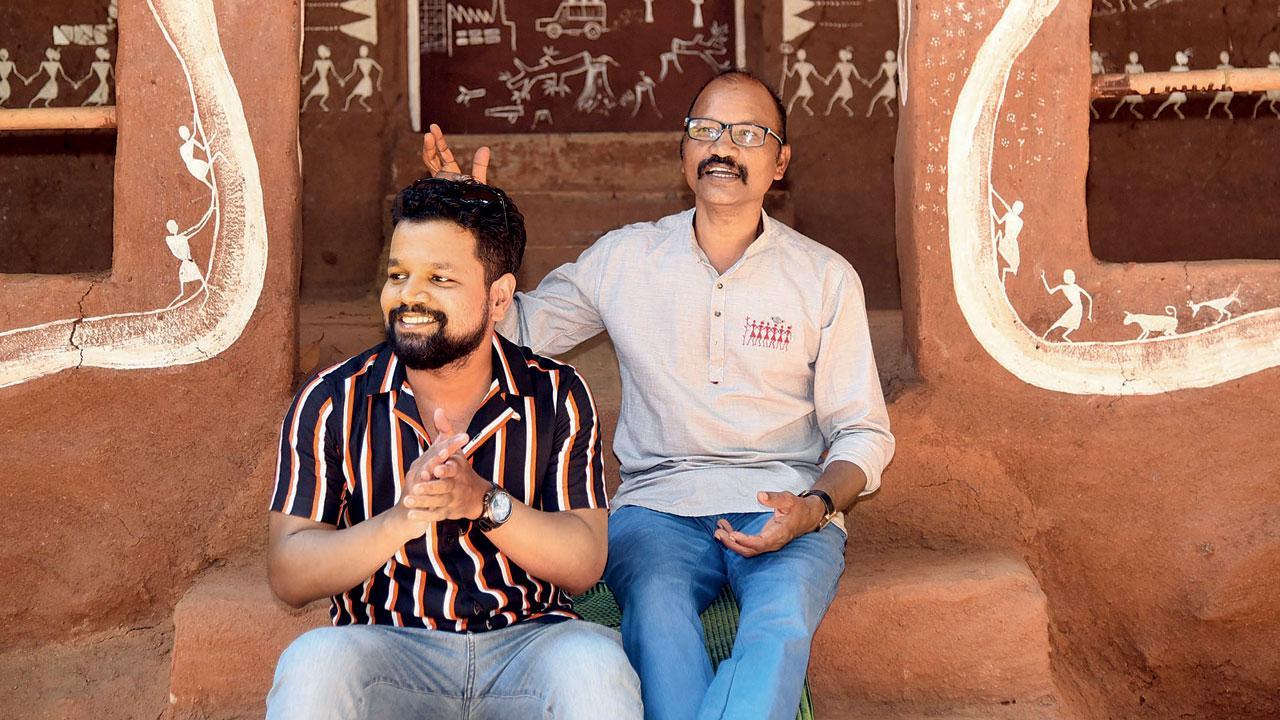A song that invokes a Warli god calls for societal action to save Aarey forest

Sparsh bassist Ajinkya Jhadav (left) and Prakash Bhoir were part of the collaboration for the track, Wagh deva. Pic/Sameer Markande
In 2018, adivasi activist Prakash Bhoir had collaborated with hip-hop crew Swadesi for a song called The Warli Revolt, which talked about how indiscriminate urbanisation was driving a knife through the heart of the Aarey forest. More than a call for action, that track had served as a war cry. The lyrics breathed fire, holding the authorities by the scruff of their neck, warning them that the adivasi populace in the area wouldn’t accept their injustices lying down. They would even take up arms if need be. “Do not mess with us,” is what the words essentially said.
ADVERTISEMENT
Three years later, Bhoir has now collaborated with Mumbai band Sparsh for another track, Wagh deva, which talks about the same issue — rampant deforestation at Aarey. But this time, he seems to have considerably mellowed down. It’s not that his anger has been tempered with resignation. It’s just that here, Bhoir’s words aren’t directed at the callous powers that be. Instead, he is requesting for external help. He is seeking divine intervention. He is beseeching the leopard — or wagh deva, a god for the adivasis — to fight for their cause since human beings clearly seem to be too stupid to get the message.
And this message is simple — nature plays by its own rules, so don’t interfere with them. Bhoir tells us, “We are all alive. We are breathing. That means we need oxygen, which we get from trees. And when trees are felled, we are stabbing nature in the back, because there are birds, animals and insects that lose their homes when even a single tree is cut down. So, I felt, let me call the leopard. He is our God; we worship him once a year. And [through the song] I told the leopard, ‘Look, our homes are being destroyed, you have to join us in this fight.”
He adds that it’s ironic that adivasis — who are often dismissed as illiterate — are intelligent enough to understand the danger when so-called educated people are turning a blind eye to the problem. Bhoir says, “The meaning of education is to stand up against what is wrong. You are only truly educated when you protest against oppression. And this fight can only be waged by people who are alive. A dead man won’t feel pain even if you bite him. So, we should prove that we are alive by raising our voice. You don’t need to be a leader. You can be an aam aadmi and do the same. We can collectively make a difference. That’s why I tell you to pinch yourself once and ask yourself, ‘Am I alive or am I dead?’ If you are alive, oppose injustice, or at least, don’t come in the way of others who are doing it, because if you do, you are as good as dead.”
Yet, when the Save Aarey movement was kick-started in 2018 in the wake of the proposed site for the Metro car shed, just a few thousand people in a city of roughly 1.8 crore citizens actually turned up at the site holding placards in protest. Bhoir feels that way more people need to pinch themselves. That’s where this song comes in, since it acts as a loudspeaker that urges the populace to awake from its slumber. And Aashish Narula, Sparsh’s manager who was instrumental in bringing about this musical collaboration, tells us that the reason the band members came on board is that they felt that they could help the track reach a larger audience.
“We introduced electronic elements so that we can connect with the youth, and we are also contacting international platforms to introduce them to the track. Today, it’s Sparsh that has collaborated with Prakash Bhoir for his voice and content. But tomorrow, we want international DJs to take it forward. The idea is to create a chain and spread the message in various markets. That’s our aim,” Narula says, while Bhoir adds that it’s not just Aarey that is facing this issue. It’s a worldwide problem, meaning that the roar of the leopard god he is invoking through this song needs to be heard across nations.
Nature knows best
Bhoir says that planting random new trees to replace felled ones isn’t always a viable solution because animals and birds need specific trees that suit their needs. “But we don’t even know the names of some of the trees that the authorities have planted here. Birds don’t even sit on them. We should leave these things to nature,” he says.
Log on to: youtube.com
 Subscribe today by clicking the link and stay updated with the latest news!" Click here!
Subscribe today by clicking the link and stay updated with the latest news!" Click here!






